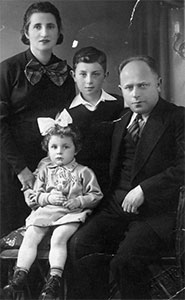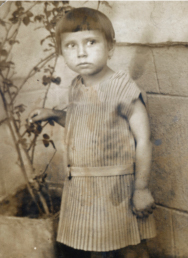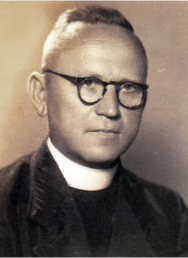
Ranana Malkhanova
LithuaniaInterviewed in Vilnius in 2005 by Zhanna Litinsksaya
Photo: Ranana Malkhanova and her family
Historical note: on 22 June 1941 Nazi Germany swept into the Soviet Union and into the three Soviet-occupied states of Estonia, Latvia and Lithuania. More than 95% of Lithuania’s Jews would be murdered over the course of the war, and more than a few non-Jewish Lithuanians joined in the killing of their neighbors. The Malkhanova famly lived in Vilkaviskis then. Ranana’s father and brother were murdered. She and her mother were sent to an overcrowded ghetto in Pilviskiai. In her story below, Ranana refers to “polizei,” which were the local Lithuanians who helped the Germans carry out their war crimes.
Read the biography
View the family pictures here.
“Lithuanians are tacit people. Nobody asked us any questions. They silently put a bowl with food on the table and heated the bath.”
On the evening of 13th November, 1941, I was in a hurry to get home, as it was fall and it gets dark early. I saw polizei men knocking on the doors of the houses where Jews had found temporary lodging and heard them swearing. Some old people, sobbing women and children were thrown out into the central square. I wasn’t that joyful kid I used to be some months ago. Tribulation made me grow up and become observant. I understood immediately that the most terrible and last action against Jews was under way. The remaining Jews in the ghetto would be murdered. I ran home and cried out, ‘Mother, let’s run!’ In a few words I told her what I had seen and my mother packed soap, towel, and underwear in the basket. We put on warm knitted jackets and headed out to nowhere in particular. We tried to convince the tailor’s family to go with us, but they refused, saying that there was no escape from those beasts and they didn’t believe it was possible to be rescued.
It was cold and drizzling. My mother and I were dragging along the soft shoulder and reached an estate. We took a risk to knock on the door. We saw a barn and went there. We slept there until dawn. I was sleeping, while my mother kept her eyes wide open. In the morning I knocked on the door. A Lithuanian opened it and let us in. There was no need of introducing ourselves, as my mother looked very Jewish. The host said that he would gladly give us a hand, but his neighbors weren’t very good men and would stooge on all of us. He said that he would let us stay for one day and then we would have to leave.
The host gave us a lot of food to eat until we were full and then we stayed in the barn the whole day. At dawn the host came and told my mother where to go. During the day he had managed to talk to somebody else regarding a shelter for us. We went to a tiny hamlet, which didn’t even have a name. An elderly Lithuanian peasant couple lived there and let us in.
Lithuanians are tacit people. Nobody asked us any questions. They silently put a bowl with food on the table and heated the bath. My mother and I enjoyed it very much.
I’m still surprised with human nature under severe conditions, when our life could end at any minute, and we were finding reasons for joy. We slept in the attic on the haystack. We stayed there for about three weeks, and then we started wandering. It’s hard, even impossible, to restore those years in my memory. We constantly changed places. At times we stayed in one place for only a couple of days, but sometimes we stayed for a couple of months. Almost nobody refused in giving us a hand. There were cases when people were scared to shelter us because of their neighbors or polizei men, but still they tried to find a place for us and directed us where to go.
We didn’t stay in the peasants’ house for very long, as there wasn’t enough room, and besides it was dangerous for us to stay there. Garrets, basements, sheds, and barns were the places for us to stay. We were very well fed. People gave us the best they had. I think the hosts didn’t let themselves eat an extra piece, but gave us milk, sour cream, a full bowl of thick soup, and a piece of pig’s fat on a slice of bread.
When we were ready to leave, the hosts gave my mother a parcel wrapped in clean linen. I remember how we hid in a hamlet in the house of the Lithuanians with the surname Marma. Their house burnt down to ashes and all of us slept on hay in the shed. The hostess cooked food on the fire in the yard. She cooked a separate dinner for us, but not worse than for her family, instead better and more substantial. I was given some clothing. I was getting bigger and, besides, while roaming the clothes wore out quicker.
The best place where we lived was in the hamlet of the Lithuanian Strimaitis family. They were very well off. They owned 40 hectares of land, which was a lot for a small Lithuanian family. By that time the Soviets hadn’t managed to take away their land. The host was an agronomist. He had a large house, beautiful orchard and I was allowed to take a stroll there and eat fruits from it. I liked to watch the horses in the stables. The Strimaitis had a lot of them.
The most important thing for me was that I had a friend now: the daughter of the hosts. Her name was Mildei. She was my age. The host told all the neighbors that I was his distant relative from Kaunas. On Sundays he took his daughter and me to the cathedral and my mother had to stay in the shed. There were interesting books in that house which I read. We stayed with the Strimaitis’ for about four times on different occasions, and each time we stayed for a few months.
After the war Ranana saw to it that the Strimatis family would be given a Righteous Gentile award by Israel’s Yad Vashem Memorial. Ranana searched for the Marma family for years but never found a trace of them.
BULLYING STORIES

“It’s something that never leaves you. It’s something you never forget, no matter how long you live.”
STANDING UP STORIES

“The priest gave me a Christian name for my false papers. I’ve kept it ever since because he didn’t just give me a name, he gave me a life.”